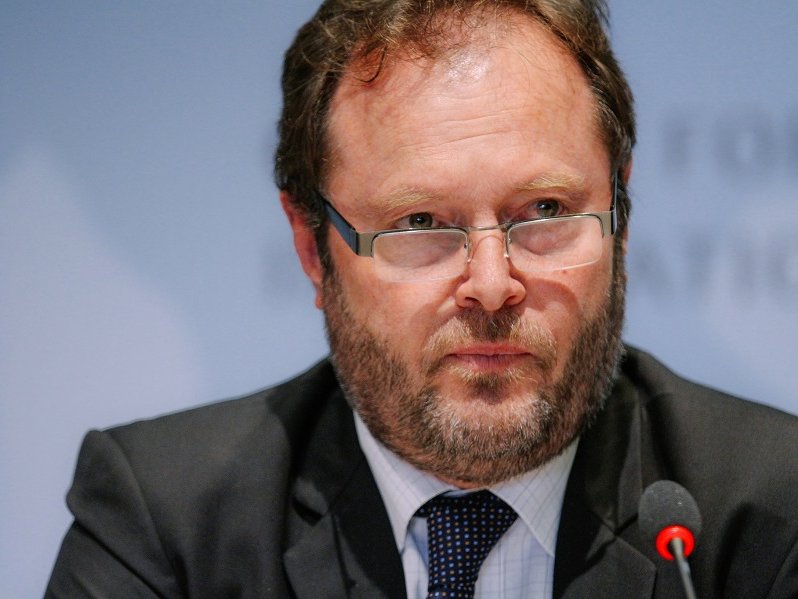United States Secretary of State John Kerry’s recent unannounced visit to Somalia sent an important signal that the US government intends to engage politically and more assertively in Somalia, said Dr. Ken Menkhaus, professor of political science at Davidson College and a specialist on Somalia and the Horn of Africa.
“This is a clear signal that the US government sees a window of opportunity in Somalia to help advance progress there, and is going to support both Somalis and external actors who are trying to move the country forward,” he said.
In a conversation with Nadia Mughal of the Independent Commission on Multilateralism (ICM), Dr. Menkhaus said that while there have been modest improvements in Somalia in recent years, they should not be overstated. “The government still has very limited jurisdiction beyond the capital,” he noted. “It has limited jurisdiction over its own security forces, it struggles with corruption on a fairly substantial level, and it has often been paralyzed with frequent leadership changes.”
Somalia faces a number of significant problems, the most immediate and visible being the extremist group al-Shabaab, Dr. Menkhaus said. Its use of terrorist tactics against the federal government and African Union peacekeepers has created an environment of fear.
However, the problem with using the label “failed state” on Somalia is it runs the risk of being a self-fulfilling prophecy, he said.
“For me the most important thing is that we get it right, that we understand that on the one hand the country still struggles mightily with governance, but on the other hand there has been some progress, and that’s something to build on.”
This discussion was part of a series of interviews done on the margins of ICM’s fourth retreat, on fragile states and fragile cities, held on May 8-9.
Listen to the interview:
Until recently, Somalia was listed as the world’s most failed state, as it suffers from ineffective governance, poverty, extremism, and frequent external interventions. To what extent is a label of “failed state” appropriate to describe the situation in Somalia, and what are some of the issues with applying this label?
It’s certainly not a very functional state at this time. We have seen improvements in recent years but they’ve been very modest and we have to be careful not to overstate them. The government still has very limited jurisdiction beyond the capital—it has limited jurisdiction over its own security forces, it struggles with corruption on a fairly substantial level, and it has often been paralyzed with frequent leadership changes. All that would throw it into the category of a fragile or a failed state.
The problem, of course, with using the label is it runs the risk of a self-fulfilling prophecy, and so there are many who are arguing that we should try to accentuate some of the positive developments and not use that particular label. For me the most important thing is that we get it right, that we understand that on the one hand the country still struggles mightily with governance, but on the other hand there has been some progress, and that’s something to build on.
Over the past few years Somalia has made progress politically and in some areas of security, yet it remains among the most dangerous places that the UN operates in. What are some of the key issues that Somalia is facing?
On the security side it’s facing a number of significant problems. The most immediate and visible, of course, is al-Shabaab’s “rejectionism” and its use of terrorist tactics and assassinations to try to block the progress of the federal government of Somalia, to attack the African Union peacekeepers that are there, and generally to undermine the confidence of the Somali people in the federal government. That has produced regular, sometimes very substantial, terrorist attacks in the capital and has created an environment of fear.
That’s also been a major constraint for international aid agencies and the UN mission in Somalia to operate outside the parameters of the international airport. Hopefully that’ll improve over time, that’s a very important part of normalization in Mogadishu and the country at large. We can’t conflate all of Somalia’s security threats with al-Shabaab, however. There are lots of clan clashes, there are revenge killings, there are business rivalries, there’s a host of other factors that sometimes create insecurity for Somalis and for international actors.
In what ways can the multilateral system’s response to the situation in Somalia be made more effective and coordinated?
The two major external actors—UN actors or UN-sanctioned actors—are the UN mission in Somalia—the political mission—and the African Union Peacekeeping Force, AMISOM. Over the past several years at times, there have been frictions between the two on a variety of issues. They have worked very hard to resolve them, and I think in the end, when you’re in the field a lot of it boils down to personality. If you’ve got personalities that can work through problems at the field level, then some of the institutional tensions can be overcome.
Earlier this month US Secretary of State John Kerry visited Somalia unannounced, becoming the highest ranking American official to visit in more than 20 years. In your view, what was the significance of Kerry’s visit?
It’s an important signal from the US government that it intends to engage politically, more assertively, in Somalia than was the case in the past. In the past it was engaged principally on security matters. It’s not that it didn’t care about political developments—it did—but the amount of engagement was relatively limited. This is a clear signal that the US government sees a window of opportunity in Somalia to help advance progress there, and is going to support both Somalis and external actors who are trying to move the country forward.
Thank you so much.
My pleasure.

